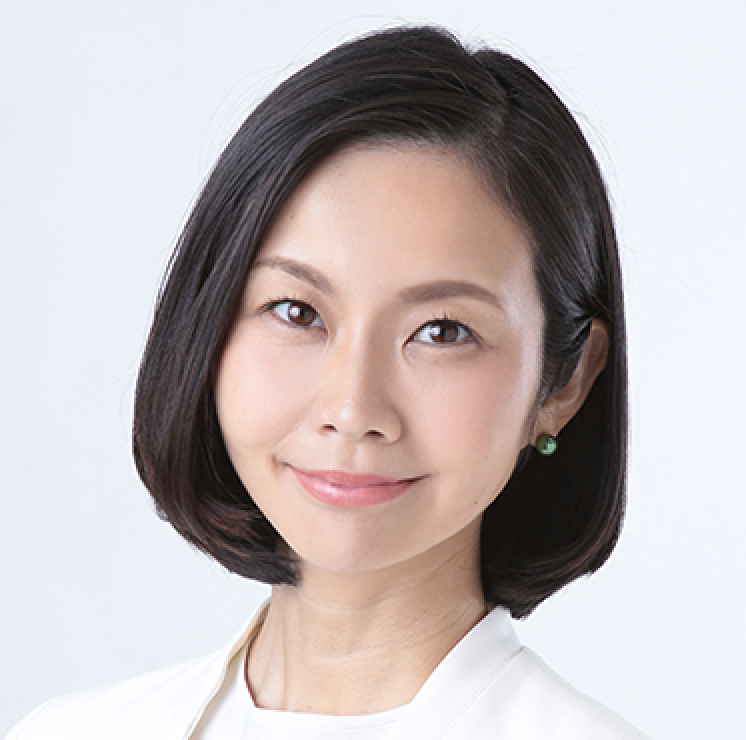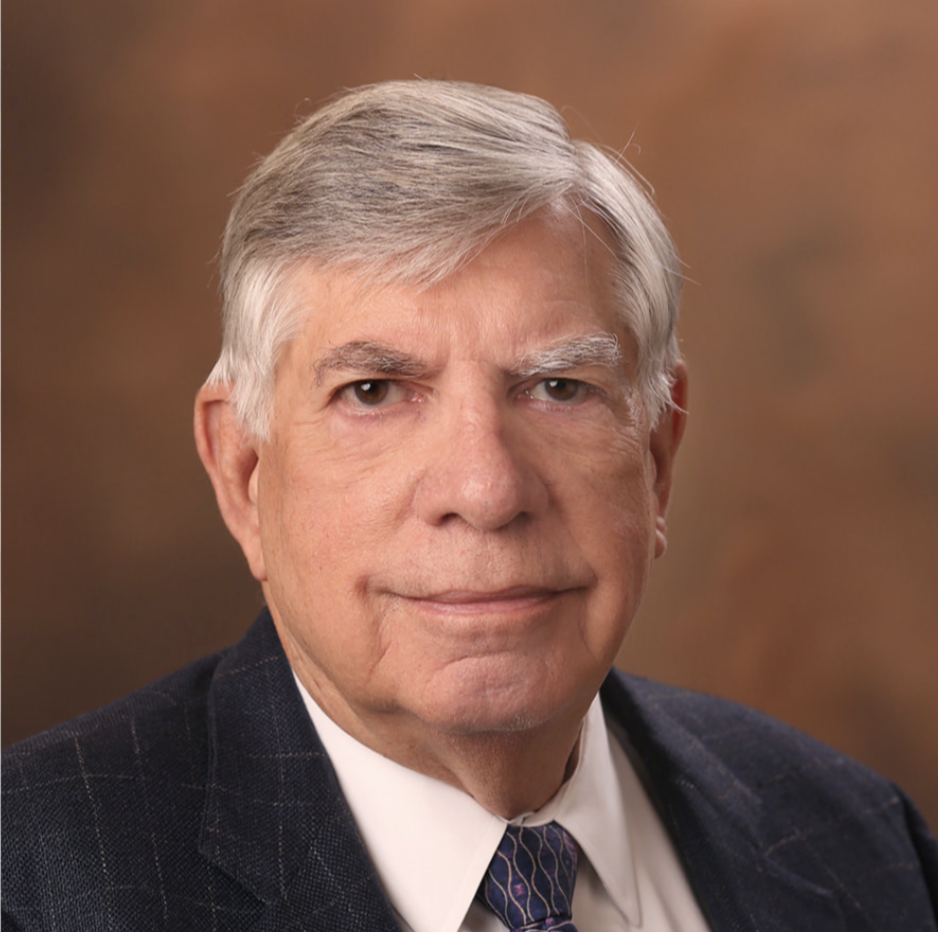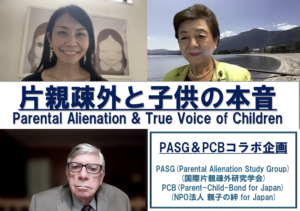Opinion exchange meeting on single parent alienation ~the true feelings of single parent alienation and children~.

Dr. Yukiko Kada and Ms. Mizuho Umemura, members of the House of Councilors who work for the protection of children's rights in Japan, were invited to a discussion session with Dr. William Bernet, founder of PASG (Parents Alienation Studies Group International), and Ken from our organization. Please take a look at what single-parent alienation is and what children's true feelings are.
What is single-parent alienation?

What is "single-parent alienation" anyway?
Dr. Burnett:
A mental condition in which a child (often a child facing separation or divorce of parents) refuses to establish or maintain a relationship with the non-cohabitating parent without justifiable and reasonable reasons.Is. (This does not apply if the estrangement is actually the result of abuse or neglect by a parent.) (*1)
Since no parent is basically perfect, and each parent has a certain amount of insight into why their child hates them (on the contrary), the way to identify the problem of single-parent alienation and the essential characteristics of the problem is to say, "Whether a child's reason for rejecting a relationship with one parent is worthy of severing that parent-child relationship as well.This is the point that "the There are a great many cases of children who are victims of single-parent alienation, where they are disproportionately affected.
*1:In a broad sense,The act of a cohabiting parent placing a child in such a situation.orThe act of a child alienating one parentIt is sometimes used to mean





How is single-parent alienation treated in psychiatric books of international and U.S. standards?
Dr. Burnett:
The DSM-5(*2) states that "Child Affected by Parental Relationship Distress (CAPRD, Child Affected by Parental Relationship Distress)Expressed as,One of the causes (in the form of a sentence) is described as single-parent alienation(*3); ICD-11 (*4) likewise.Caregiver-Child Relationship Problem (CCRP, Caregiver Child Relationship Problem)This is expressed in the statement, "The
AFCC(*5) and NCJFCJ(*6),Child abuse where single parent alienation can cause the above mental illnesses.(*7). Prior to that,Various criminal and civil penalties have already been stipulated for single-parent alienation in many countries and statesTherefore, it can be said that the perception that "single-parent alienation is child abuse" is already a generalization.
*2: Diagnostic and Statistical Manual of Mental Disorders, published by the American Psychiatric Association.
*3:Child Affected by Parental Relationship Distress (Impact on children of deteriorating relationship between parents)
*4: International Classification of Diseases, 11th Revision
*5: Association of Family and Conciliation Courts
*6: National Council of Juvenile and Family Court Judges
*7:AFCC & NCJFCJ Acknowledge Parental Alienating Behaviors Are a Cause of Parent-Child Contact Problems (Behavior of one parent alienated causes deterioration of parent-child interaction)
On the Scientific Aspects of Single Parent Alienation



What evidence do you have to support that "single-parent alienation is child abuse?"
Dr. Burnett:
Qualitatively, the problem has long been defined as child abuse in various countries with different cultural, linguistic, and historical backgrounds. That is, regardless of social factors,As long as they are born as human beings, children want love from their parents.and, therefore, the act of taking a parent away from a child (without just and reasonable cause) is defined as abuse.
Quantitative evidence has been presented in a number of papers, and some representative examples are presented below.
- Parental Alienation as a Form of Emotional Child Abuse (Single parent alienation as psychological child abuse)
- Parental Alienation Behaviors and Family Violence (Single parent alienated behavior and domestic violence)
- The Five-Factor Model for the Diagnosis of Parental Alienation (Five Factor Model for Diagnosis of Single Parent Alienation)



Conversely, are there those who claim that single-parent alienation is not child abuse? What is the basis for their argument?
Dr. Burnett:
There are some who argue that "single-parent alienation does not exist in the first place" or "it is not abuse because it happens naturally regardless of the words and actions of the cohabiting parents. However, there is no significant scientific basis for such claims, and only a few people with extreme beliefs say so.
Sociological Aspects of Single Parent Alienation



From a non-psychological (e.g., sociological) perspective, I believe that single-parent alienation is detrimental to the welfare of the child because it prevents the child from accessing the social resources (e.g., intelligence and job skills) of one parent.
Dr. Burnett:
That perspective is exactly right.
So, basically, socially accepted ideas have been formed that the act of "not allowing children to see their parents" itself is extremely harmful to the development of the children. On top of that, the "What are the cases in which it is better not to allow children to see their parents until such harm is actively inflicted on the children?The main focus of the project is on the following point.


How to recognize single-parent alienation



Are there any criteria you use to identify children suffering from single-parent alienation?
Dr. Burnett:
There are five criteria.
(1) A child living with one parent is currently denied access to the non-living parent.
(2) That the nonresident parent and the child have previously had a good relationship.
(iii) There are no facts of abuse, etc. by the non-living parent that would warrant rejection by the child.
(iv) The cohabiting parent's behavior is intended to aggravate the parent-child relationship between the child and the noncohabitating parent.
(5) The child's reasons for rejecting the non-living parent are not worthy of rejecting the non-living parent in light of generally accepted norms.



How has Dr. Burnett identified children suffering from single-parent alienation in his court practice in the United States?
Dr. Burnett:
Depending on the age of the child, etc., it is actually very simple.
First, interviews are conducted with the child andIf a child states, "I don't want to see my parents," I suspect single-parent alienation. The reason is that when we actually let these children meet their non-living parent several times in a relaxed environment, they begin to say the exact opposite in almost all cases, "Why didn't you come see me sooner?
Conversely, children who have been abused or neglected say, "I want to see my parents. They say things like, "But please stop hitting me," or "This time, I want you to face me and talk to me properly.
And only in this case, the work of carefully discerning whether the child should be allowed to see his or her parents, and the facts of abuse and neglect, will take the form of a subsequent process.



Is it that "the kids want to see their parents anyway?"
Dr. Burnett:
Yes, I have. At least I have never seen a child who hates his/her parents from birth.



What is the procedure for a U.S. family court to investigate the psychological status of a child?
Dr. Burnett:
The process varies slightly from state to state, but is as follows
(1) Interview the couple in the same room.
(2) Individual interviews from each couple.
(iii) One parent and the child are present and interviewed respectively (conducted with both parents).
Social institutions to protect children from single-parent alienation



In terms of social institutions, what measures are necessary to protect children from single-parent alienation?
Dr. Burnett:
More than anything else,We need to educate the public.Institutions, especially those involved in child protection work. Next in line are the courts.
I myself have been responsible for educating Tennessee court officials and others, and if they do not understand the issue of single-parent alienation, it can cause very serious problems for the children of society as a whole.



What steps are being taken to save children from single-parent alienation?
Dr. Burnett:
Step-by-step measures are taken, beginning with a court order by a court official with the right expertise to provide counseling and other treatment to children who have fallen into the mental state of single-parent alienation, followed by a program to restore a healthy parent-child bond.



Which countries have good social systems for the protection of those children's welfare and which countries should be used as a reference?
Dr. Burnett:
Many countries, including the U.S., are working on this, with Denmark in particular having a well-developed institutional design.
exchange of opinions





Am I correct in my understanding that the importance of joint custody and the severity of the problem of single-parent alienation is more pronounced the further along the child is in development?
Dr. Burnett:
That's right. Because the more the ego grows, the more the child's opinions come to the surface.



There is a view that sole custody in Japan stems from the old family system. In the past, children were treated as the property of the male patriarch, and later, when gender equality was advocated, it went beyond gender equality to the assertion of female authority, and we have even noticed a tendency for children to be treated as the property of women. Now, at last, I feel that signs of a shift to "gender equality" in its original sense are beginning to emerge in Japan.
Dr. Burnett:
A similar phenomenon existed in the United States 100 to 50 years ago. In the U.S., in the past, children were the property of men, and then extreme feminism arose, and the next thing you know, children were treated as the property of women, a situation that is widely known from the movie "Kramer Kramer" and other movies. Then, about 50 years ago, society as a whole began to consider what true gender equality was, and Arizona was the first state to introduce joint custody, which quickly became a civil right and spread throughout the United States.
PCB Ken:
When I work with NPOs, when I, as a man, explain the problem of parent-child disconnection, they do not take me seriously. On the other hand, when I tell them about a mother who panics when her infant is taken away from her, they understand and say, "Parent-child interaction is a must! and there are those who show understanding. This issue tends to be drawn into the gender debate, which seems to be a kind of paradigm in itself, and it seems that "Fathers and mothers are equally important to childrenWe feel that we would like as many people as possible to reexamine the point that



Finally, can you give us some background on how Professor Barnett came to address the issue of single-parent alienation?
Dr. Burnett:
At first, I was simply interested in hearing about a friend's case who had gone through a divorce.
Then, as I actually took charge of custody issues in the courtroom and advanced my practice, I became aware of the serious problem of single-parent alienation, which is hitting a very large number of children.
Since then, we have shifted our main area of activity from clinical to academic, and have been trying to make more people aware of this problem and help as many children as possible.



Dr. Burnett, Councilor Kada, and Councilor Umemura, I learned a lot from you. Thank you very much.



Thank you very much.
Summary of Opinion Exchange Meeting Original (English)
Finally.
NPO Oyako no Kizuna for JAPAN has a variety of people from high school students to housewives working as volunteer staff. We are looking for people who are willing to work together with us. We would be very grateful if you could give us some consideration.
Please feel free to contact us using the inquiry form.

